Is Matcha Keto? Facts, Benefits, and FAQs
Matcha has been used in Asian cultures for thousands of years. As awareness of its health benefits increased in the West, matcha has surged in popularity across the United States. But is matcha keto-friendly?
Yes, matcha is low in carbs, and you can enjoy matcha tea on the keto diet as long as it’s unsweetened and mixed with keto-friendly ingredients.
Learn how to make keto-friendly matcha and discover its impressive health benefits.
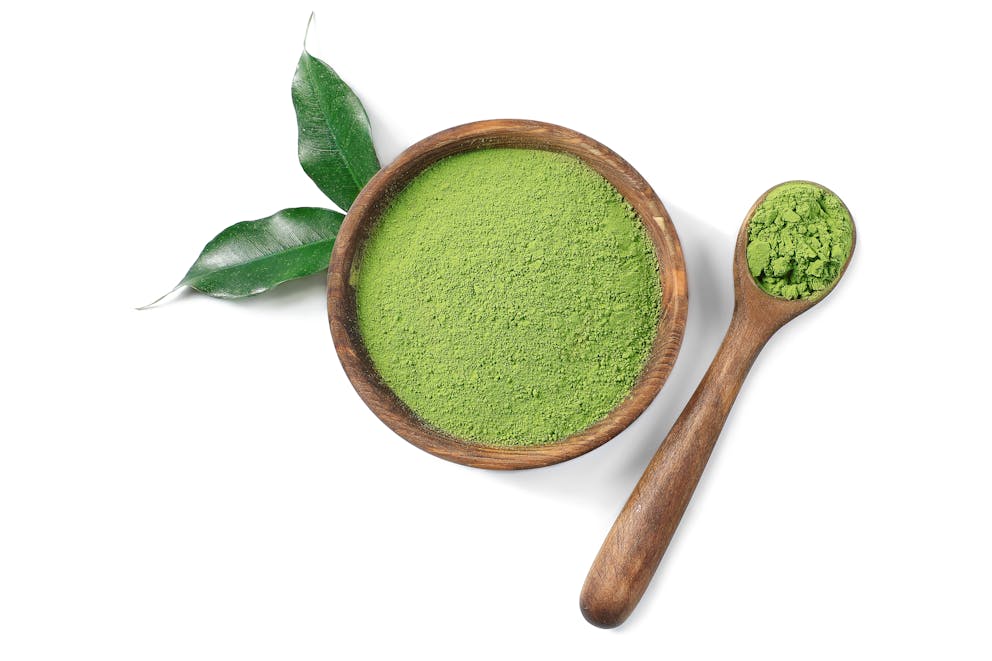
What is matcha?
Matcha is a Japanese green tea powder harvested from the leaves of the Camellia sinensis plant.
Regular green tea is praised for its health benefits and is typically sold as dried leaves. However, matcha is a super-concentrated green tea extract made by grinding the green tea leaves into a fine powder.
While traditional green tea is prepared by steeping leaves in hot water, matcha powder is dissolved into water or milk, allowing for the consumption of the entire leaf.
Consuming whole green tea leaves is associated with various health benefits, including:
Skin support
Improved metabolism
Cardiovascular benefits
Enhanced brain function
Anti-cancer properties
Watch the video below to learn more about the health benefits of green tea.
How many carbs are in matcha?
According to data from the U.S. Department of Agriculture (USDA), two teaspoons of organic matcha tea powder contains between 2 and 3 grams of carbohydrates.
However, matcha green tea is popularly combined with cow’s milk, whipped cream, coconut milk, or almond milk, which can increase the carb count of matcha latte drinks.
Here is the approximate carb count of different matcha beverages per one-cup serving:
Cow’s milk matcha: 15 grams
Whipped cream matcha: 10 grams
Coconut milk matcha: 6 grams
Almond milk matcha: 3 grams
Is matcha keto-friendly?
Yes, matcha is keto-friendly because it’s low in carbs.
Matcha is also rich in amino acids and antioxidants and contains caffeine, making it an excellent choice to boost energy levels and promote the body’s nutrient stores.
A matcha iced latte is a delicious way to enjoy green tea on a ketogenic diet. However, cow’s milk is high in carbs and not the best choice for preparing a keto-friendly matcha.
Instead of regular milk, it’s best to use low-carb milk alternatives such as almond or coconut milk to keep your carb intake low and stay in ketosis.
Though milk alternatives may add small amounts of net carbs to matcha tea, they also offer various essential nutrients, including:
Vitamin B2
Vitamin E
Magnesium
Phosphorus
Iron
Copper
Antioxidants
Matcha tea is often used as a replacement for morning coffee or pre-workout energy drinks, as it provides a caffeine boost without added sugars or artificial ingredients. High-quality matcha also doesn’t make you jittery, instead helping you stay focused and calm.
However, matcha does contain some carbs and should be included in your daily net carb count to maintain ketosis and stay in fat-burning mode.
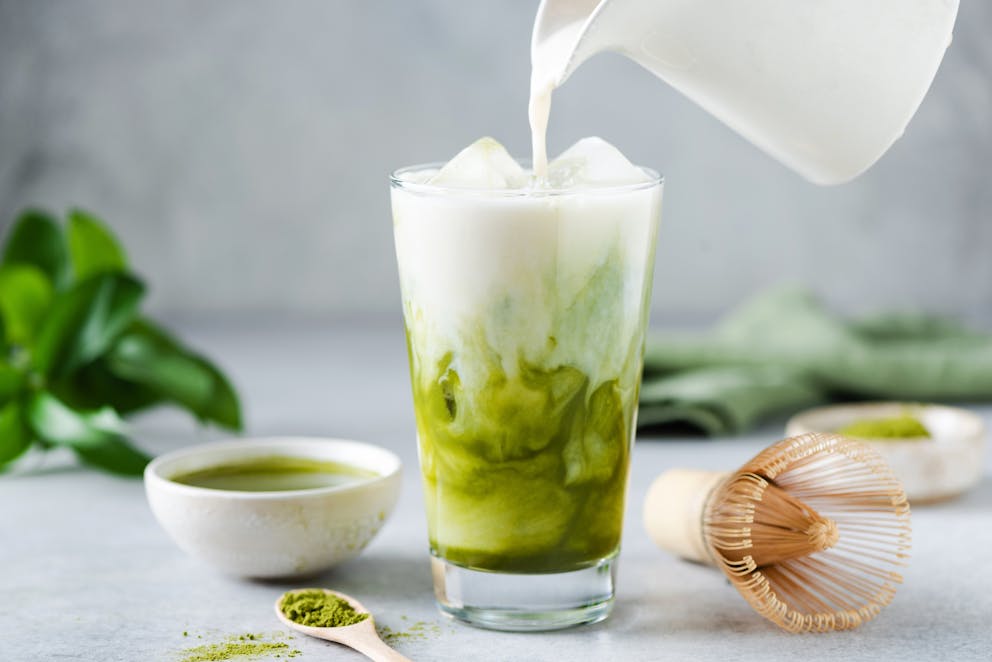
How to make keto-friendly matcha
Enjoy a flavorful, energy-boosting coffee alternative with this refreshing and low-carb vanilla keto matcha latte recipe.
Here’s how to make an iced matcha latte in five minutes or less:
Total time: 5 minutes
Serves: 1
Per serving: 36 calories, 1.6 g protein, 3 g carbohydrates, 2.5 g fat
Ingredients:
1 cup unsweetened vanilla almond milk
1 tsp matcha powder
5 drops vanilla stevia
Instructions:
Add almond milk, matcha, and stevia to a blender.
Blend ingredients until matcha powder has fully dissolved.
Pour over ice.
Recipe tips:
You can reduce or add more stevia to taste.
If you don’t have vanilla stevia drops, substitute with a keto-friendly sweetener and vanilla extract.
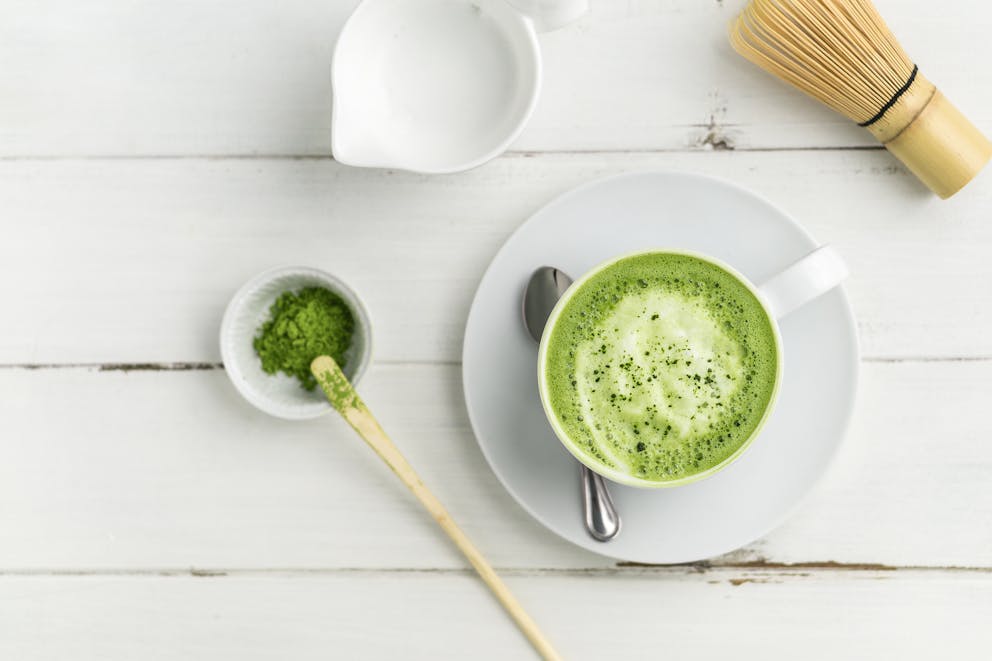
5 benefits of matcha
Matcha has been used in China and Japan for over a millennium as a natural remedy and in traditional ceremonies.
This concentrated form of green tea has long been touted for its calming effects and is often used by Zen Buddhist monks to promote mental clarity while meditating.
Here are five benefits of matcha.
1. Supports skin health
Consuming matcha has various benefits for skin health.
Research published in Antioxidants shows that green tea contains antimicrobial and anti-inflammatory compounds, which help reduce sebum production and support acne healing.
The polyphenols in green tea may also help maintain moisture and protect against free radicals on the skin, which is linked to a lower risk of wrinkles and premature aging.
2. Anti-cancer properties
Matcha contains epigallocatechin gallate (EGCG), a compound shown to have antiproliferative effects in cancer cells.
A study published in Nutrients showed that EGCG demonstrated the most potent ability to induce death in cancer cells out of all the compounds present in green tea.

3. May improve brain function
Regularly drinking matcha may promote optimal brain function and help protect the brain from neurodegenerative diseases.
Matcha contains L-theanine, an amino acid that has been shown to help maintain alertness and improve concentration on tasks.
“L-theanine is very calming. Drinking matcha won’t make you feel jittery like coffee while boosting energy and mental clarity,” explains Dr. Berg.
The EGCG found in matcha also plays a role in brain health. A study published in Molecules discusses the positive effects of EGCG on brain function and its ability to reduce neuroinflammation, which is often connected to diseases like Alzheimer's or dementia.
4. Cardioprotective effects
Green tea has been extensively studied for its cardioprotective effects, and regularly drinking matcha may benefit vascular function.
According to research published in Current Medical Chemistry, various catechins found in green tea have been shown to inhibit vascular inflammation, which is linked to a lower risk of heart disease.
Matcha may also reduce high blood pressure. Evidence published in Alternative Therapies in Health and Medicine concluded that green tea supplementation significantly reduced systolic and diastolic blood pressure in patients with hypertension.
5. Promotes a healthy body weight
Matcha may improve weight loss by enhancing fat oxidation during exercise.
According to a study published in the International Journal of Sports Nutrition and Exercise Metabolism, "Matcha resulted in lower respiratory exchange ratio and enhanced fat oxidation during a 30-minute brisk walk.”
For those using the keto diet to lose weight, incorporating matcha into your daily routine may help you burn more fat.
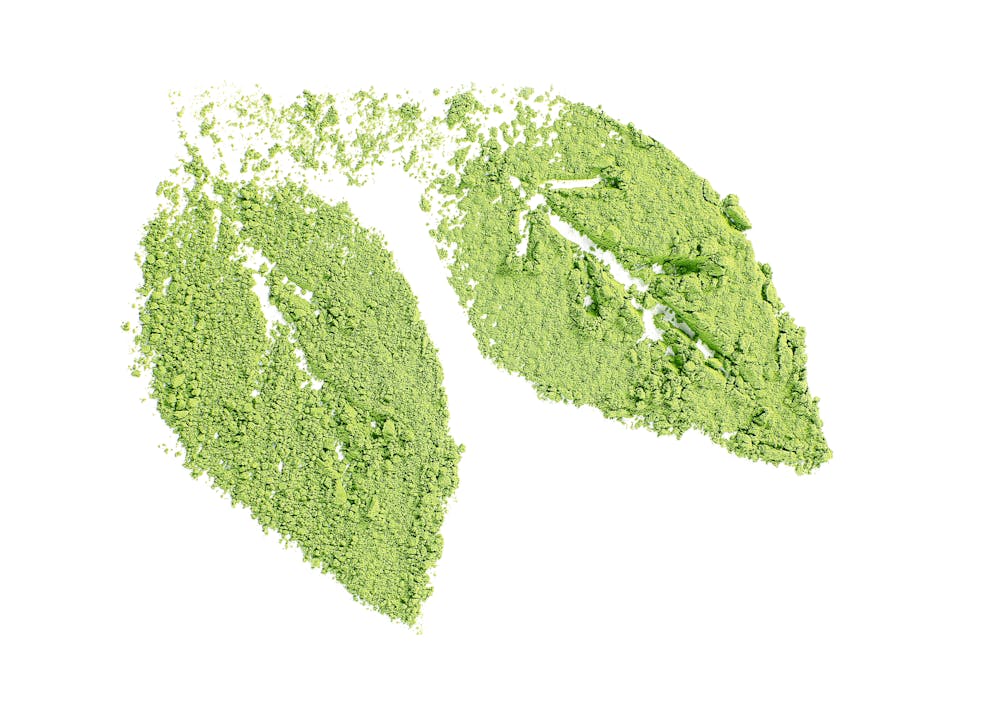
Who shouldn’t drink matcha?
Though matcha green tea powder can be a healthy addition to the keto diet, it’s not for everyone, as some people may experience adverse effects from drinking matcha tea.
Matcha may not be the best choice for individuals with these conditions.
1. Caffeine sensitivity
Caffeine increases adrenaline, giving most people an energy boost to start their day. However, those with a caffeine sensitivity can experience heightened effects from caffeinated beverages.
Symptoms of caffeine sensitivity include:
Headaches
Heart palpitations
Anxiety
Jitteriness
Diarrhea
Nausea
Light-headedness
If you experience adverse effects after drinking matcha, you may want to consider caffeine-free alternatives such as herbal teas or decaffeinated green tea.
2. Iron deficiency
While the high EGCG content in matcha has many health benefits, it can inhibit iron absorption.
Evidence published in the Journal of Food Science found that excessive green tea consumption can lead to iron deficiency anemia.
Those who are iron-deficient may benefit from avoiding teas containing EGCG and tannins to support optimal nutrient absorption.
3. Sleep problems
Because matcha is a caffeinated tea, those with insomnia or other sleep issues may experience heightened sleep problems.
Large quantities of caffeine throughout the day may interfere with your ability to fall and stay asleep.
Research published in Sleep Medicine Reviews found that caffeine consumption reduced total sleep time by 45 minutes and concluded that caffeine shouldn’t be consumed within nine hours before bedtime to avoid sleep reduction and disruptions.
While matcha contains about half the caffeine in coffee, those with sleep issues may benefit from avoiding or limiting matcha intake.
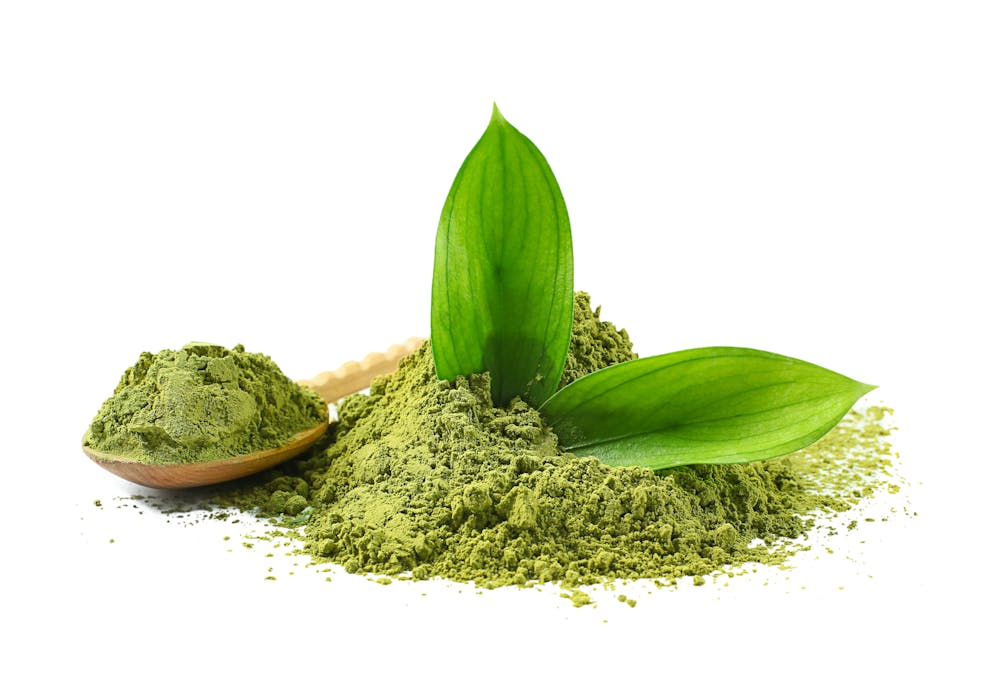
Key takeaways
Is matcha keto? Yes, matcha is a keto-friendly, concentrated tea powder derived from green tea leaves.
Consuming matcha can support skin health and promote a healthy body weight while lowering the risk of heart disease and cancer.
However, those with caffeine sensitivities, iron deficiency, or sleep problems should avoid matcha, as it could worsen these conditions.
FAQ
1. How many carbs are in matcha?
Two tablespoons of plain matcha tea contains around three grams of carbohydrates. However, matcha lattes are typically made with milk or milk alternatives, adding extra carbs to the drink.
A keto matcha latte prepared with one cup of full-fat canned coconut milk contains around six grams of net carbs. A matcha tea made with unsweetened almond milk has around three grams of net carbs per one-cup serving.
2. Does matcha stop ketosis?
Matcha is a keto-friendly tea low in carbs that won’t stop ketosis if consumed in moderate amounts.
However, mixing matcha with cow’s milk can significantly increase the carb count of matcha drinks, and it’s best to use keto-friendly options such as almond or coconut milk.
3. Is matcha tea from Starbucks keto-friendly?
No, Starbucks’ Matcha Tea Latte isn’t suitable for a Healthy Keto® diet. It contains 34 grams of carbohydrates, which can spike blood sugar levels and quickly push you out of ketosis.
You can make a similar version at home using matcha powder, unsweetened almond milk, and vanilla stevia drops.
4. Is it healthy to drink matcha every day?
Yes, drinking moderate amounts of matcha daily is associated with various health benefits. Matcha can support skin health, boost energy levels, and may lower the risk of heart disease.
5. Does green tea support ketosis?
Yes, matcha green tea powder is low in carbs and rich in antioxidants. Matcha has also been shown to increase the rate at which calories are burned, which can help facilitate fat-burning and weight loss.
6. Can I have matcha while fasting?
Yes, you can have matcha while fasting. Sipping on matcha in the morning may help you fast for longer and avoid reaching for high-carb foods, which will kick you out of ketosis. However, mixing matcha with milk isn’t fasting-friendly, as matcha lattes contain too many calories and carbs.
Though matcha green tea contains caffeine to support energy levels, it also has a calming effect that can put you at ease while fasting.
7. What are the benefits of matcha while on keto?
Matcha is rich in antioxidants and may provide various benefits with regular consumption, including improved skin moisture and acne reduction, sustained energy, and mental clarity.
Drinking matcha tea powder may also help lower cancer risk, support optimal blood pressure, and boost fat-burning.
8. How much caffeine is in matcha?
While matcha does contain caffeine, it’s less than an average cup of coffee. One cup of coffee contains between 100 and 140 milligrams of caffeine. In contrast, one cup of matcha only contains approximately 70 milligrams of caffeine.
Sources
Previous blog
Keto Vegetarian Diet Guide: Foods, Benefits, and Risks
Popular
08/21/2024
54.3K views
02/23/2025
45.8K views
11/18/2024
273.7K views
03/18/2024
11/21/2022




